Have you ever wondered how AI in e-learning sector is bringing a dramatic change?
This magical tech isn’t meant just for robots. It is penetrating every industry vertical and transforming the way we learn or educate.
In the current tech-driven age, artificial intelligence works as a smart friend who knows exactly how you learn best. It’s making education and e-learning experience more effective than ever.
Imagine you have a tutor who can quickly figure out anything in seconds and give you the right way to learn things better.
As technology and innovation change the old practices, AI in e-learning is emerging as a buzzing trend. From schools to universities and tutors to educational platforms, every segment in the education sector is leveraging the benefits of artificial intelligence in education in several ways.
According to Reports, AI in education market is projected to surpass $6 Billion by 2024. This is due to the growing adoption of AI-driven education. And the increasing demand for smart e-learning solutions across multiple industries.
If you are also preparing or have a vision to leverage the advantages of AI in education. Then, here we will explore how AI is transforming the e-learning landscape.
This blog will take you on a journey through this amazing world of AI in e-learning. You will know how AI technology is shaking things up in the e-learning industry and what future opportunities it offers.
So let’s get started
Table of Contents
Understanding The Role Of AI In E-learning
Artificial intelligence in e-learning works like an intelligent and automated tool. It operates by employing various AI algorithms in e-learning applications and improves several educational aspects. Artificial intelligence automates various repetitive as well as manual tasks and offers better insights and solutions. It speeds up data processing and other functions within the e-learning software applications and enhances its efficiency.
Thus, AI works as a smart and power-boosting tool that enables e-learning applications or educational platforms to perform advanced-level actions. If we take a quick look at the core functioning of AI in e-learning, it works in the following ways.
- Data Collection and Analysis: AI gathers and examines vast amounts of data, like how a student interacts with online materials, the time taken to complete tasks, and areas where they might struggle.
- Pattern Recognition: It looks for patterns in the data. For instance, it can observe that a student does well with videos but struggles with written explanations.
- Personalization: AI then uses these patterns to create a personalized learning path for the student. It could offer more videos or interactive activities instead of written materials, for example.
- Predictive Analysis: AI algorithms can predict future learning needs based on past behavior. If a student tends to face challenges in a particular area, AI might proactively offer extra help before the problem arises.
- Feedback and Improvement: As the student engages with the materials, AI continuously gathers new data and adapts its approach. If the student does better with certain types of activities, AI provides more of those.
Benefits Of AI in Education
The integration of Artificial Intelligence (AI) in e-learning applications offers numerous benefits. AI in education holds the potential to revolutionize the learning process by providing personalized, efficient, and engaging learning experiences for learners. It empowers educators to enhance their teaching methodologies and leverage technology trends. Implementing artificial intelligence in education platforms or e-learning mobile applications brings a wide array of benefits for both educators and learners.
Personalized Learning
AI customizes learning experiences, adapting content, pace, and methods to suit individual student needs. This personalized approach caters to various learning styles. As a result, it improves engagement and knowledge retention.
Adaptive Learning
AI-powered systems adjust content based on a student’s performance. This provides tailored educational materials and challenges as per learners’ capabilities. Thus, it ensures students progress at their own pace without feeling overwhelmed or left behind.
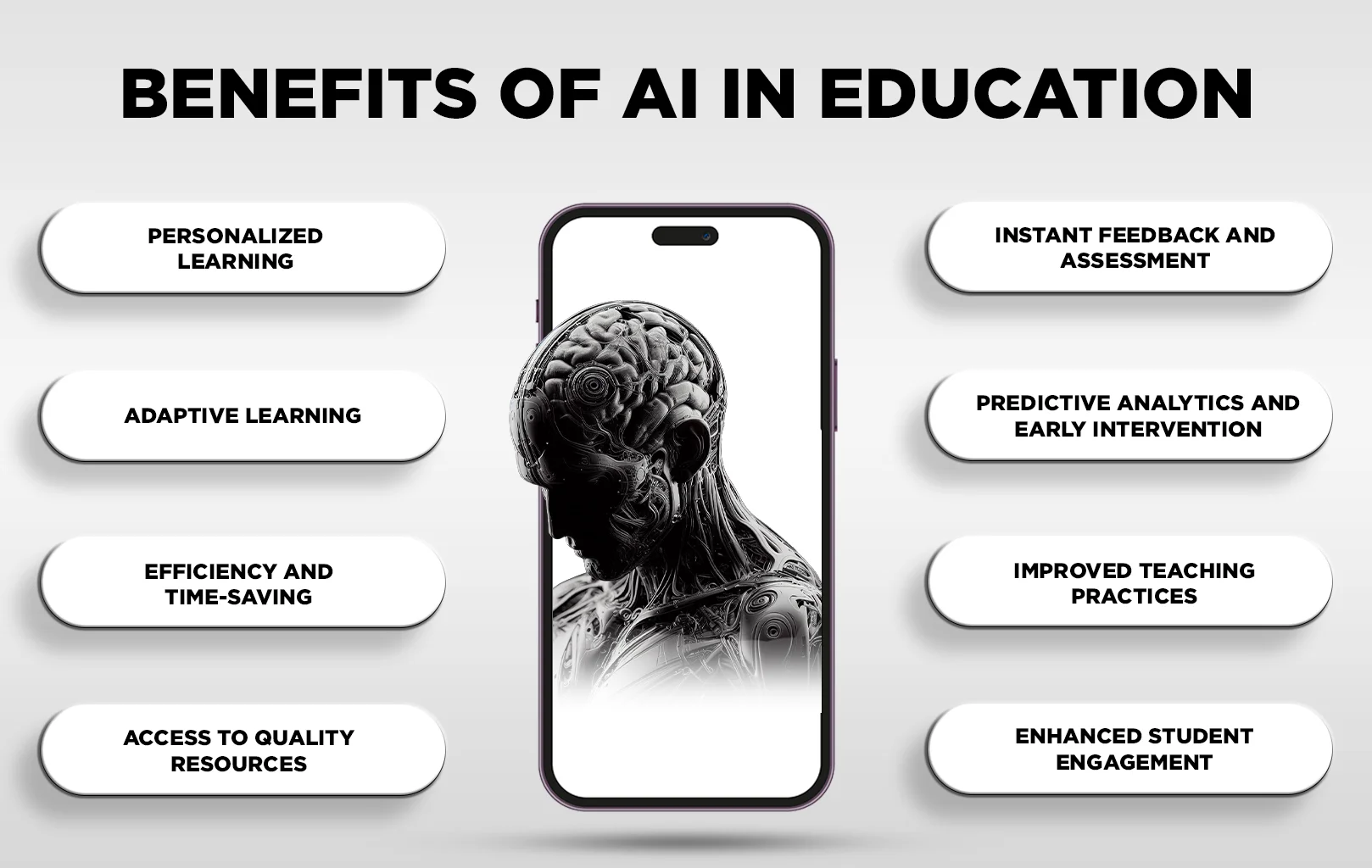
Efficiency and Time-Saving
Artificial intelligence automates administrative tasks, such as grading and organizing coursework. This allows educators and service providers to focus more on teaching and offer individual support to each student.
Access to Quality Resources
AI in e-learning assists in curating and creating high-quality educational materials. It ensures students have access to diverse, adaptive, and well-curated e-learning resources that with their learning styles.
Instant Feedback and Assessment
It provides immediate and personalized feedback to students. This instant assessment helps students understand their strengths and areas for improvement promptly, contributing to a more effective learning process.
Predictive Analytics and Early Intervention
By implementing AI algorithms e-learning software applications can predict future outcomes and identify potential hurdles in a student’s progress. Educators can intervene early to address issues. Thus, they can prevent difficulties and improve overall student performance.
Improved Teaching Practices
This technology supports teachers in recognizing individual learning needs and preferences. It enables them to adapt their teaching strategies to better suit their students. As a result, this empowers educators and tutors with more effective instructional methods.
Enhanced Student Engagement
AI in e-learning fosters more interactive and engaging learning experiences through personalized content, interactive activities, and adaptive learning tools, resulting in increased student motivation and participation.
Data-Driven Insights
Artificial intelligence in e-learning generates data that provides valuable insights into student learning behaviors. This helps educators to make informed decisions. Consequently, improves instructional practices and brings better e-learning solutions.
How AI Is Transforming The E-learning Landscape?
Artificial intelligence is revolutionizing the e-learning sector in multiple ways. It has transformed various traditional teaching and learning practices. Today, educational institutions and e-learning platforms are using AI and machine learning tools to provide personalized, interactive, and accessible learning experiences. It is the power of AI that has widened the doorway to world-class education for all.
Whether it is educational institutions, private educators, or e-learning mobile applications, every market segment is leveraging AI in e-learning app development to build smart e-learning solutions. As a result, AI is transforming the world of e-learning and its future. How? Here is below
1. Personalize Learning Experience
AI is reshaping the learning experience by tailoring education to suit individual needs. By analyzing each student’s unique learning style, preferences, and performance, AI adapts content and learning materials. This personalized approach ensures that students receive learning experiences that resonate with their strengths and areas needing improvement.
2. AI Chatbots in E-learning
AI powered chatbots play a vital role in providing immediate assistance to students. These virtual assistants can offer guidance, answer queries, and provide support round-the-clock. They contribute to a more interactive and engaging learning experience, addressing students’ doubts and concerns promptly.
3. Interactive E-learning
AI enhances e-learning experiences by introducing interactive elements such as simulations, games, and virtual labs. These tools make learning more engaging and practical, allowing students to apply theoretical knowledge in a hands-on environment.
4. Accessibility to World-Class Education
AI in e-learning opens doors to world-class education, breaking geographical barriers. With AI-driven platforms, students from various locations can access high-quality educational resources and expert instruction, democratizing access to education.
5. Data-Driven Insights for Educators
AI generates valuable insights for educators by analyzing vast amounts of student data. This information helps in understanding student performance, engagement, and learning patterns. Educators can use these insights to adapt their teaching methods, offer tailored support, and reduce the education app development cost.
6. Smart Virtual Tutors and AI Mentors
AI-powered virtual tutors provide personalized guidance to learners. These intelligent mentors simulate human-like conversations, offering explanations and support aligned with each student’s learning style. They ensure continuous access to learning support and guidance. However, you will need to hire dedicated app developers to build these features in your eLearning app.
7. Real-time Feedback and Assessment
AI facilitates immediate assessment and feedback for students. Whether through quizzes, assignments, or interactive activities, AI offers instant insights, empowering students to learn from their mistakes promptly.
8. Intelligent Content Curation and Recommendation
AI-driven platforms curate and recommend educational content based on individual interests and proficiency levels. By analyzing student interactions, AI suggests relevant courses and resources, ensuring learners are exposed to material that suits their learning preferences.
9. Adaptive Learning for Individualized Progress
AI adapts content to match each learner’s pace and style. It identifies areas for improvement and strengths, ensuring students receive targeted support and challenges to progress effectively.
10. Bridging the Skill Gap Effectively
AI helps bridge skill gaps by identifying areas where students need more assistance. Offering personalized learning paths and resources, helps students build on their strengths and improve weaker areas effectively.
Top Ways To Integrate AI In E-learning
There are several ways to integrate artificial intelligence in e-learning. With AI, e-learning app developers and education app development companies can build smart LMS and e-learning apps. Education service providers and e-learning platforms can enhance security, create AI-curated content, and do many things.
Integrating these AI algorithms in mobile applications can significantly transform the e-learning experience. As a result, it makes digital education more personalized, engaging, and effective for students and educators alike.
Personalized Learning Paths: Implement AI algorithms to create customized learning paths for students based on their learning styles, preferences, and performance.
AI-Powered Chatbots and Virtual Assistants: Integrate AI chatbots and virtual tutors to provide immediate assistance and guidance to learners.
Content Curation and Recommendation Engines: Use AI to curate and recommend learning materials and resources based on students’ interactions and preferences.
Predictive Analytics for Student Success: Employ AI-driven predictive analytics to identify potential areas where students might struggle. And thus improve overall student performance.
Automated Grading and Feedback: Utilize AI in e-learning to automate grading and marking processes for students. This, eventually, speeds up the efficiency.
Enhanced Course Design and Instructional Support: Use AI for data-driven insights to inform educators about student performance and preferences. This information can aid in adapting course design and instructional support for better engagement and learning outcomes.
Natural Language Processing (NLP) Applications: Integrate NLP models to enhance language learning, provide translation services, and facilitate communication between students and educators, fostering a more inclusive and supportive learning environment.
Conclusion
Hence, it is evident how AI is changing the entire e-learning landscape. Artificial intelligence comes with advanced and innovative capabilities for building disruptive solutions. It empowers the education and e-learning sector with numerous benefits. AI is transforming the current landscape into a world where education becomes more tailored, interactive, and accessible for learners globally.
As digitalization is taking online learning to the next level, the growing use of AI in e-learning certainly offers a promising future for both educators and learners. And therefore, AI will play an even more influential role in making learning accessible and enjoyable for all.
RipenApps is a leading elearning app development company that specializes in building AI-powered e-learning solutions. Bring your idea to the table and we will turn it into a feature-powered e-learning application.


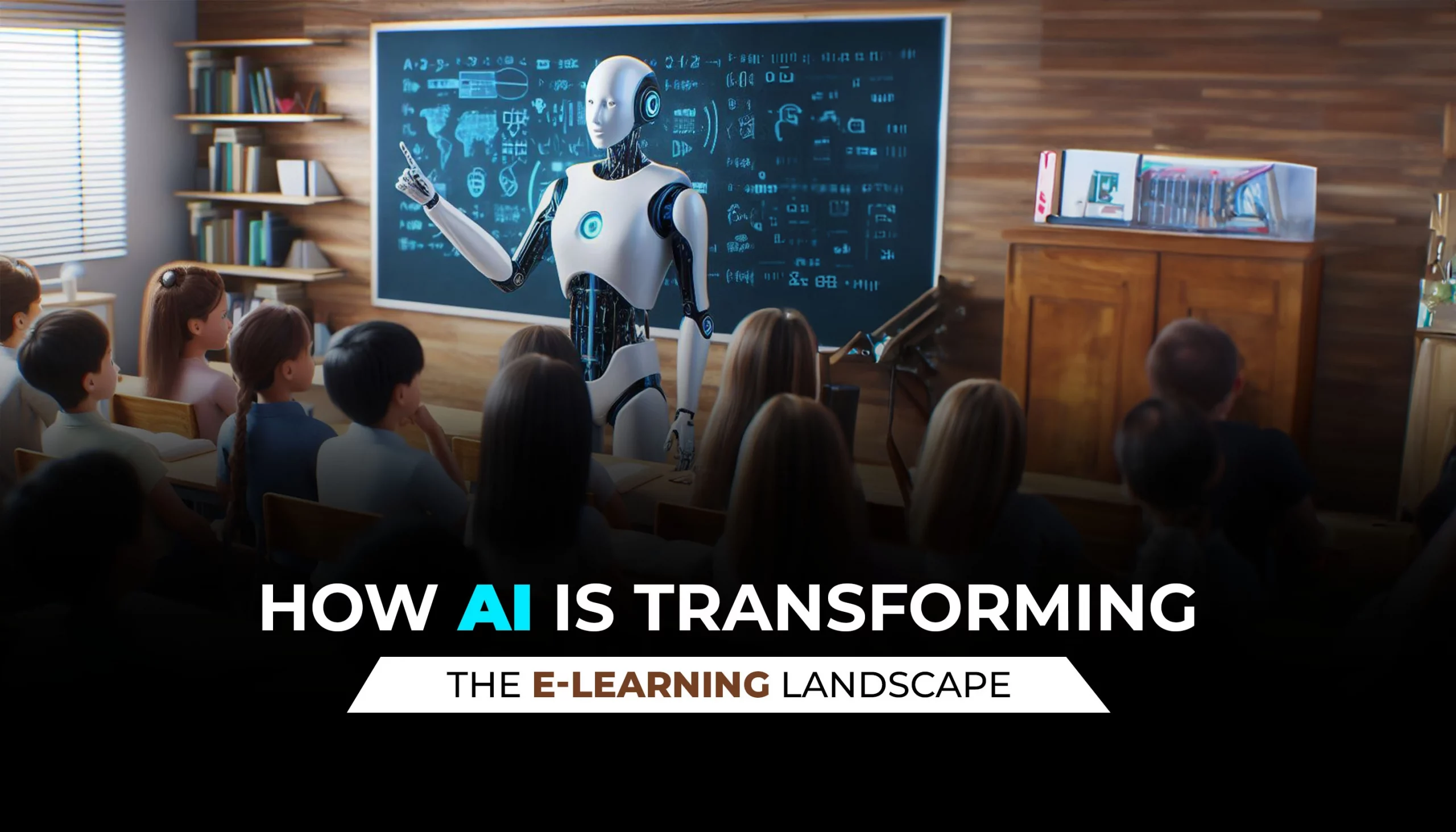





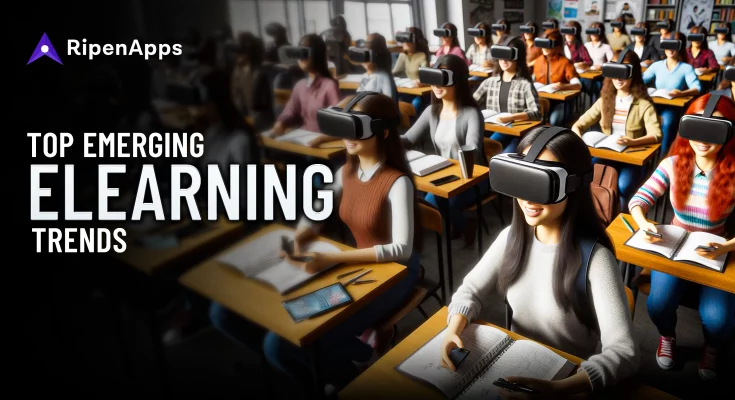
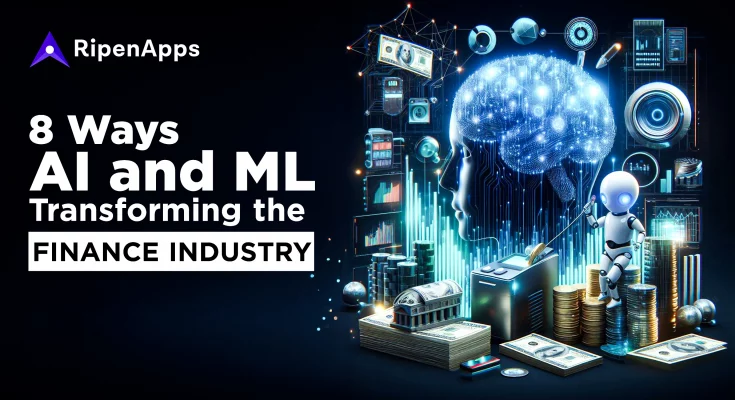
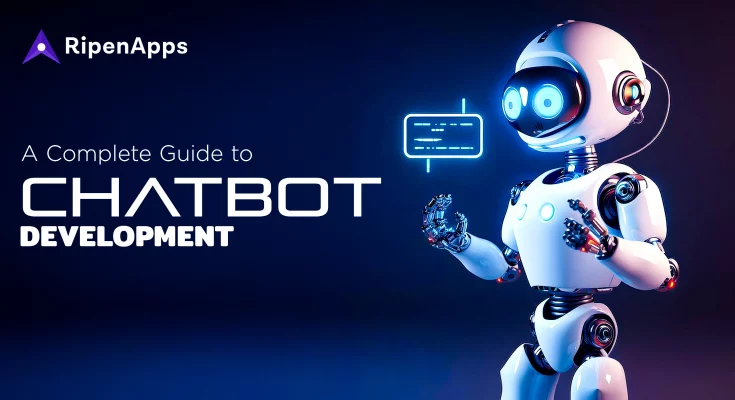

 India
India USA
USA Australia
Australia Canada
Canada UK
UK UAE
UAE